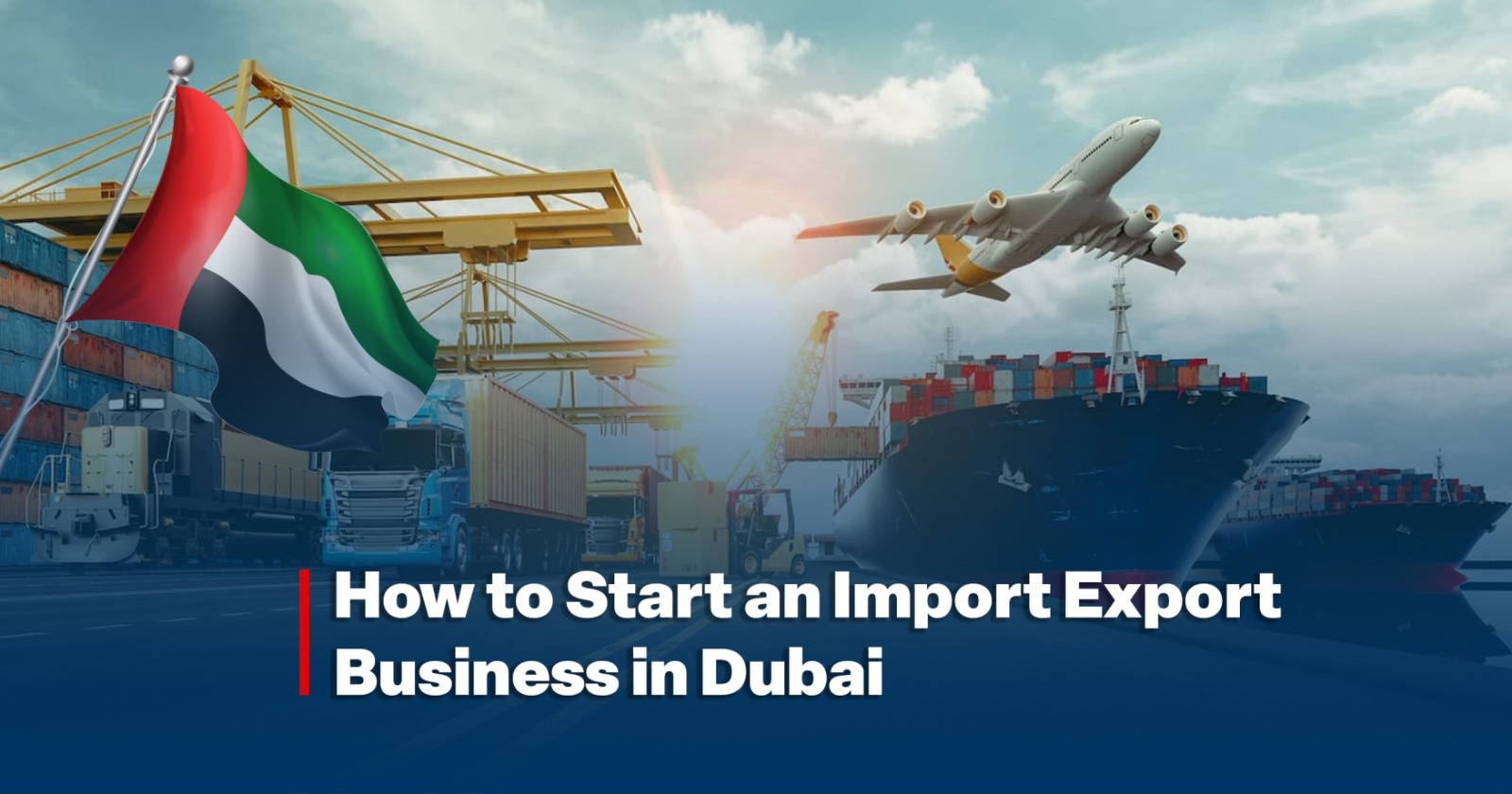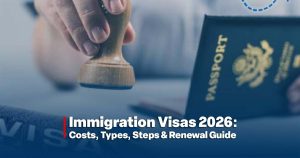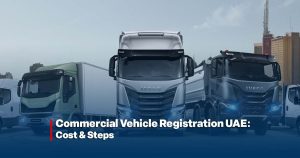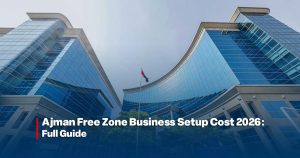Import export business in Dubai is growing fast in 2025, with non-oil foreign trade reaching AED 2.6 trillion, according to Dubai Customs (dubaicustoms.gov.ae).
Why are so many investors choosing this city for global trade? The answer lies in its ports, tax benefits, and unmatched location. In this guide, we’ll cover the 9 key steps you need to start your business today.
Table of Contents
Toggle- What is the import export business in Dubai?
- The Top 9 Advantages of a Dubai Import-Export Business License
- Top Products in Dubai’s Import Export Business (2025 Guide)
- What types of licenses are required to start an import-export business in Dubai?
- What are the key documents and visas required for the business setup process?
- How do I start an import export business in Dubai?
- Import Export Business License in Dubai: Cost, Fees, and Key Factors 2025
- Where can I get help to start an import export business in Dubai?
- Summary
- FAQ’s
What is the import export business in Dubai?
The import export business in Dubai involves buying goods from other countries and selling them locally or sending local goods abroad. Dubai’s strategic location, world-class ports, and tax benefits make it a key hub for global trade, attracting many entrepreneurs and companies.
The Top 9 Advantages of a Dubai Import-Export Business License
Getting your import export license in Dubai isn’t just about following rules. It’s your key to accessing one of the planet’s top trading cities. Think of Dubai as a central hub where the world comes to do business. In Q1 2025, the UAE’s non-oil foreign trade jumped an impressive 18.6%, according to official reports. This proves Dubai is a major player and the perfect home for your trading company.
Why Is a Dubai Import-Export Business License Important?
- Direct Global Market Access: Dubai connects to 180+ shipping routes and 400+ flight connections, giving fast reach to over 200 countries.
- Strategic Location Advantage: Positioned between Asia, Africa, and Europe, Dubai reduces shipping times by up to 40% compared to other trade hubs.
- Full Foreign Ownership in Free Zones: Zones like JAFZA and DMCC allow 100% ownership with no local partner required.
- Tax Relief and Incentives: zones offer 0% corporate and personal tax, helping businesses keep higher profits and reinvest.
- Legal and Banking Protection: Holding a license ensures compliance with Federal Law No. 2 of 2015, which builds trust with banks, partners, and global suppliers.
- Simplified Customs Clearance: Dubai Customs’ Mirsal 2 electronic system speeds up clearance and reduces operational delays.
- Re-Export Opportunities: Nearly 45% of Dubai’s imports are re-exported, making it a strong hub for redistribution across the Middle East, Africa, and beyond.
- Scalability and Expansion: Business Expansion Potential. With dual licensing options, you can trade both on the mainland and internationally. This gives unmatched flexibility for scaling your business.
- mainland and free zones, providing access to both domestic and foreign markets on the mainland and in free zones.
- Government Support and Infrastructure: With projects under Vision 2030, including expansions at Jebel Ali Port (top 10 globally), businesses benefit from unmatched logistics.
Important Advantages of Obtaining a Dubai Import-Export License
| Benefit | Advantage | Impact |
| Global Market Access | 180+ routes, 400+ flights | Reach 200+ countries faster |
| Strategic Location | Between 3 continents | Cuts shipping time by 40% |
| Free Zone Ownership | 100% ownership allowed | Full control of profits |
| Tax Relief | 0% corporate and personal tax | Higher margins and reinvestment |
| Customs Efficiency | Mirsal 2 e-clearance | Faster shipments, lower costs |
| Re-Export Strength | 45% of imports re-exported | Strong global hub |
| Expansion Options | Dual licensing available | Trade mainland + free zones |
| Infrastructure | Jebel Ali, Vision 2030 | Long-term business stability |
An import export business license in Dubai is more than permission to trade. It provides global access, tax savings, legal protection, and full ownership opportunities. Dubai’s strategic location and advanced infrastructure give traders a strong foundation for long-term success.
Top Products in Dubai’s Import Export Business (2025 Guide)
Dubai stands out as a global trade hub. Its location, advanced ports, and tax-free zones help connect Asia, Europe, and Africa. If you’re planning to enter the import export business in Dubai, knowing what sells most can help you decide. Below are the top products often traded from or through Dubai.
Top-Traded Products in Dubai
| Product Category | Details |
| Electronics & Phones | Most are re-exported to Africa and the GCC. Includes mobiles, laptops, and gadgets. |
| Gold & Precious Metals | High volumes of gold, silver, and jewelry move through Dubai each year. |
| Vehicles & Auto Parts | New and used cars are exported to the Gulf, Africa, and CIS regions. |
| Machinery & Tools | Essential for construction, energy, and industrial projects. |
| Oil & Gas Products | Lubricants, fuel oils are exported from UAE refineries. |
| Apparel & Textiles | Re-exported to Asia, East Africa, and CIS. High-volume shipments. |
| Food & Agriculture | Grains, canned goods, and packaged food are exported across the Middle East. |
| Medical Devices | Dubai has become a hub for hospital and lab equipment trading. |
| Furniture | Shipped to GCC, East Africa, and South Asia via Jebel Ali Port. |
| Plastic & Chemicals | Key for manufacturing and cleaning industries. |
- Gold and electronics lead Dubai’s exports, backed by strong infrastructure.
- Jebel Ali Port supports over 180 shipping routes.
- Dubai’s ports make handling bulky and high-value items easier.
- Free zones allow easy storage, trade, and customs clearance.
This list helps you decide what to trade. Focus on demand and shipping access. Need support? Business LinkUAE helps with trade licenses, setup, and customs codes.
What types of licenses are required to start an import-export business in Dubai?
Beginning an import export business in Dubai requires the right license. Each license type defines how you operate, what goods you can trade, and the benefits you receive. Choosing carefully helps you avoid delays, stay compliant, and grow your trade smoothly.
Quick Overview of Key Licenses
- General Trading License
Trade many goods like electronics or food. Works for import, export, and re-export. Good for flexibility. - Free Zone Trade License
Best for free zone companies. Offers 100% foreign ownership. No customs duty on imports. - Import/Export Code
Needed to clear goods at customs. Must-have for any trading business.
| Feature | General Trading License | Free Zone Trade License |
| Location | Dubai Mainland | Dubai Free Zones |
| Ownership | 100% in most sectors | 100% foreign ownership |
| Trading Scope | Anywhere in the UAE | Free zone + global only |
| Customs Duty | Usually applies | Often exempt |
Full List of Import Export Licenses
These are the main types of import-export licenses to know the differences between commercial and industrial licenses:
1. Commercial License
- Covers import, export, and re-export of specific goods
- Issued by Dubai’s Department of Economic Development (DED)
- Best for companies focused on one product sector
2. General Trading License
- Allows trading in a wide range of goods such as electronics, food, or textiles
- Provides flexibility for businesses handling multiple items
- Needs a higher investment compared to a standard commercial license
3. Industrial License
- For companies importing raw materials
- Permits local manufacturing and exporting of finished products
- Suitable for factories and large production units
4. Professional License
- Issued to service or consultancy firms supporting trade
- Low-cost business setup option for niche businesses
- Not intended for large-scale product trading
5. Free Zone Trading License
- Available in zones like JAFZA, DMCC, and DAFZA
- Provides 100% foreign ownership
- Offers tax exemptions and simplified customs clearance
6. E-Commerce License
- For importing and selling goods through online platforms
- Works for both UAE and international sales
- Useful for digital traders leveraging Dubai’s logistics network
7. Offshore License
- Designed for global trade outside the UAE
- Allows 100% ownership
- Does not permit direct sales within the UAE market
8. Dual License (Free Zone + Mainland)
- Allows companies to operate on the mainland and in free zones
- Requires registration in both jurisdictions
- Good for traders wanting access to all markets
Comparison of Import Export Business Licenses in Dubai
| License Type | Main Purpose | Local Market Access | Key Benefit |
| Commercial License | Import/export specific goods | Yes | Most common for single-sector trading |
| General Trading | Trade across multiple categories | Yes | Flexibility across industries |
| Industrial License | Manufacture and export goods | Yes | Supports local production + re-export |
| Professional License | Consultancy and services | Yes | Lower setup cost for niche operators |
| Free Zone License | Trade from within free zones | Limited | 100% ownership, tax advantages |
| E-Commerce License | Online trading and logistics | Yes | Best for digital businesses |
| Offshore License | International trade only | No | Focus on global trade |
| Dual License | Operate in mainland + free zone | Yes | Access to both the UAE and global markets |
Dubai provides several license options for traders. Whether you need flexibility, manufacturing approval, or global reach, there is a license to fit your plan. By matching the right license to your business activity, you set a strong base for a successful import export business in Dubai.
What are the key documents and visas required for the business setup process?
Setting up an import export business in Dubai is straightforward when your documents are ready. Proper paperwork avoids delays, proves compliance, and speeds up approvals. Below is a clear list of the essential requirements.
Documents Required for Import Export Business License in Dubai
| Document | Purpose | Applies To |
| Passport Copy | ID for business owners and shareholders | All applicants |
| UAE Visa or Entry Permit | Proof of residency or entry | UAE-based applicants |
| Emirates ID | Identity verification for residents | UAE residents only |
| Passport Photos | For official records and approvals | All applicants |
| Company Name Choices | Needed for trade name reservation | All setups |
| Trade Name Reservation Certificate | Legal approval of the company name from DET | All setups |
| Initial Approval Certificate | Government clearance for the chosen activity | All setups |
| Company Application Form | Required to start the license process with DED | All applicants |
| MOA (Memorandum of Association) | Defines the roles and rights of partners | Mainland businesses only |
| Lease Agreement / Ejari | Confirms a valid office or warehouse address | Mainland & Free Zone setups |
| Customs Code Registration | Enables import/export with Dubai Customs | All import/export firms |
| Special Permits | Clearance for restricted goods (food, pharma, chemicals) | Specific sectors only |
Why Documents and Visas Matter?
In addition to these documents, securing the right visas is also part of the business setup process. A free zone visa may be necessary for free zone businesses; however, investors frequently seek a UAE residency visa. investor visa is issued for those holding company shares. Preparing both the documents and visas together ensures your import export license application is accepted without delays.
Submitting the right documents is the foundation of building an import export business in Dubai. With proper preparation, you ensure compliance, gain faster approvals, and create a strong base to expand in both local and international markets.
If you’re not sure where to start, working with a local business setup expert can make the process smoother and more efficient.
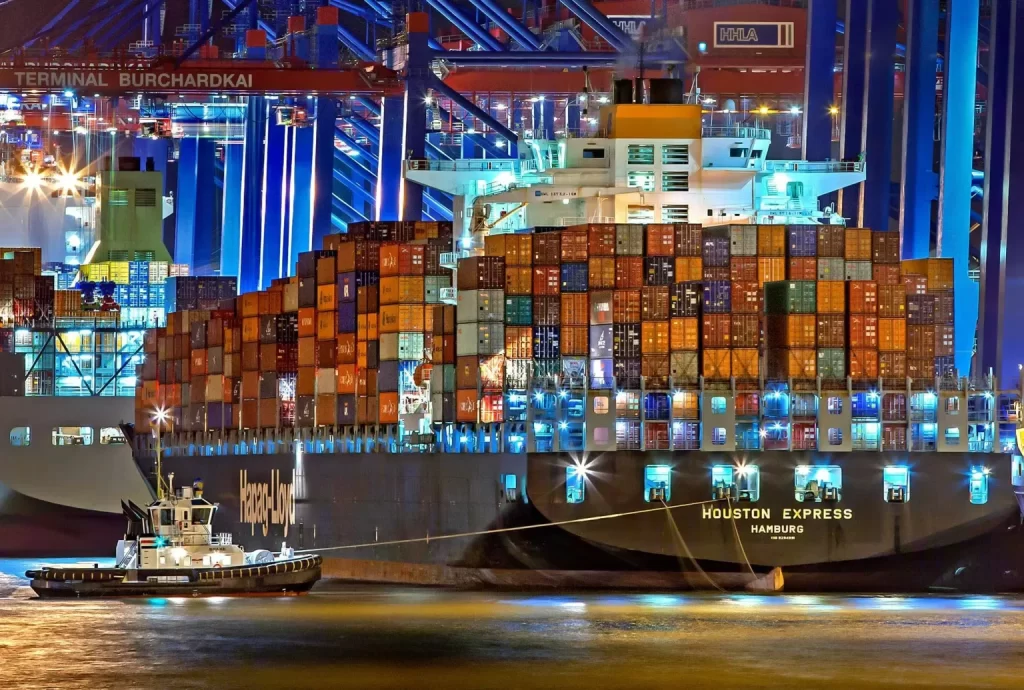
How do I start an import export business in Dubai?
Setting up your import export business in Dubai is a straightforward process when you know the steps. Dubai’s government has designed the system to be efficient, helping you start your trading company quickly. Follow these nine clear steps to get your license and join one of the world’s top trade hubs.
The Complete 9-Step Process
| Step | What to Do | Why It’s Important |
| 1. Define Your Business Activity | Decide exactly what products you will import or export (e.g., electronics, food, textiles). | This establishes the precise kind of license for which you must apply. |
| 2. Choose Mainland or Free Zone | Pick your business location. Mainland lets you trade locally. Free Zones offer 100% ownership and tax benefits for international trade. | This is your biggest choice, affecting your ownership, taxes, and customer base. |
| 3. Select and Reserve a Trade Name | Pick a unique name for your company and get it approved by the authorities. | Your business name is your brand and must follow UAE naming rules. |
| 4. Secure Initial Approval | Submit your initial application to the Department of Economy and Tourism (DET) or your chosen Free Zone. | This is the official confirmation that your business activity is permitted. |
| 5. Prepare Personal Documents | Gather passports, visa copies, and Emirates IDs for all business owners and partners. | This verifies the identity of everyone involved in the company. |
| 6. Draft and Notarize Legal Documents | Prepare MOA for mainland companies or the standard incorporation documents for free zones. | These documents specify the structure and legally establish your business. |
| 7. Secure a Physical Business Address | Rent an office, warehouse, or a flexi-desk in your chosen jurisdiction. | A legal address is mandatory to complete your registration. |
| 8. Obtain Your Customs Code | Apply for and receive your unique code from Dubai Customs. | This code is essential; without it, you cannot legally ship goods in or out of the country. |
| 9. Pay Fees and Receive Your License | Settle all government and processing fees. Your official business license will then be issued. | An import export business license in Dubai gives you the legal right to trade, open a bank account, and sign contracts locally and worldwide. |
A More Detailed Look at the Crucial Steps
Mainland vs. Free Zone:
- This choice is crucial.
- Free Zones (like Jebel Ali Free Zone/JAFZA or Dubai Multi Commodities Centre/DMCC) are perfect if your goal is international trade.
- They offer 100% foreign ownership, zero import/export taxes, and fast setup times.
- A Mainland license is better if you want to supply goods within the UAE itself, though ownership rules can differ.
The Customs Code
- Don’t overlook this. Your customs code is as important as your business license.
- It registers you with Dubai Customs and is your key to using their world-class ports and airports.
- You can’t move anything without it.
Understanding Costs
- Beyond government fees, remember to budget for your office space, visas for you and your staff, and potential costs for legal and PRO services to help with the application.
- Getting help from a local expert can often save you time and prevent costly errors.
Final Advice
The process to get your import export license in Dubai is clear and well-organized. The best approach is to prepare your documents early and understand the difference between a mainland and a free zone company. By following these nine steps, you’ll have a strong foundation for a successful trading business in the heart of the global market.
With Dubai’s strategic plans for economic growth, there has never been a better time to make your move.
Import Export Business License in Dubai: Cost, Fees, and Key Factors 2025
Beginning an import export business in Dubai means understanding the costs up front. There’s no single price. It depends on your setup, location, and how many extras you need.
Here’s everything broken down clearly.
7 Factors That Affect Your Costs
- License Type: Free zone or mainland license affects fees. Free zones often include packages with visas and offices. The mainland gives wider trading access in the UAE.
- Business Activity: Some activities require extra government approvals. Importing restricted goods also adds to the cost.
- Office or Warehouse Lease: You need a real or virtual space. Cost depends on location and size.
- Visa Applications: Employee visas or investor visa come with government charges. More visas = higher cost.
- Customs Code Registration: To import or export through Dubai Customs, you must register your customs code.
- Third-Party Approvals: If your goods fall under controlled sectors (like food or pharma), expect extra permits and fees.
- Other Admin Costs: Includes name reservation, approvals, notarizing documents, etc.
Estimated Cost Table (2025)
| Item | Cost Range (AED) | Notes |
| Trade License | 12,000 – 18,000 | Based on setup and activity |
| Office/Warehouse Lease | 15,000 – 25,000 | Virtual offices may cost less |
| Customs Code Registration | 1,000 – 2,000 | One-time setup with Dubai Customs |
| Investor Visa (per person) | 4,000 – 6,000 | Varies by number of partners/staff |
| Name Reservation | 600 – 1,000 | Depends on chosen name |
| Initial Government Approval | 1,000 – 1,500 | DET or Free Zone Authority |
| MOA & Notary (Mainland only) | 1,500 – 2,000 | Legal document processing |
| Special Permits | Case-by-case | For restricted or regulated goods |
| Ejari (if mainland) | 3,500 – 8,000 | Lease registration for office |
Total Setup Cost Range
- Dubai: AED 20,000 to AED 35,000 on average
- Ras Al Khaimah (RAK): From AED 12,500 to AED 30,000
- Sharjah: Lower entry packages possible for small firms
- Warehouse-based setups: May reach AED 100,000+ with staff and bulk space
Key Takeaways
- Depending on what you trade, pick the appropriate area and license.
- Get exact quotes before applying. Small changes affect price.
- Ask about included services. Some zones bundle visas and workspace.
- Don’t ignore hidden charges—check customs, permits, and Ejari needs.
Want to reduce errors and save money?
Talk to a local expert before applying. They’ll walk you through the correct process and help you avoid delays.
Ready to get started? Reach out and get your custom quote now.
Where can I get help to start an import export business in Dubai?
You can get help from:
- Free zone authorities such as JAFZA or DMCC
- Dubai Chamber of Commerce for market data
- Dubai Customs for clearance procedures
- Business setup consultants who help you through licensing, visas, and banking
These resources simplify the procedure and save you time.
Summary
If you’re serious about starting your import export business in Dubai, now is the time.
This guide, Import Export Business in Dubai, gave you what matters—real products, markets, and trade flows.
With Business LinkUAE by your side, you get clear steps, expert help, and full support from day one. Don’t wait. Call us now to register your company and start trading through Dubai’s global gateways. The market is moving. Are you?
Contact our team today by phone at +97143215227, WhatsApp at +971502052735, or email at connect@businesslinkuae.com to receive clear answers, expert advice, and hands-on assistance. This will enable you to attend your appointment fully prepared and confident.
FAQ’s
Can enquiry MOHRE assist foreign investors in hiring workers for their import export business in Dubai?
Yes, enquiry MOHRE provides guidance and support for employers, including foreign investors, in hiring, renewing work permits, and resolving disputes. This service ensures business operations run smoothly under the UAE labour law.
How do employment laws impact the import export business in Dubai?
Employment laws regulate hiring, wages, worker safety, and contract terms. MOHRE enforces these laws, and businesses, including import export, must comply to avoid fines or delays in operations.
Is the import export business in Dubai profitable for small companies?
Yes, many small and medium-sized firms succeed in trade. With limited capital, you can start by:
- Choosing a free zone license for lower setup costs
- Focusing on niche products with high demand
- Using third-party logistics providers instead of owning warehouses
This approach reduces expenses and allows growth step by step.
What are the risks of starting an import export business in Dubai?
While opportunities are high, traders should be aware of risks:
- Fluctuating exchange rates
- Delays in shipping and logistics
- Competition from established global players
- Sudden changes in trade policies
To reduce these risks, always check trade laws, sign clear contracts, and work with trusted suppliers.
How much does it cost to begin an import export business in Dubai?
Starting an import export business in Dubai costs between AED 20,000–35,000 in the first year. Free zone licenses begin at AED 12,000–15,000, while mainland setups cost more. Expenses include visas, office rent, customs codes, and permits, with Dubai’s strong trade network ensuring profitability. (100%)

